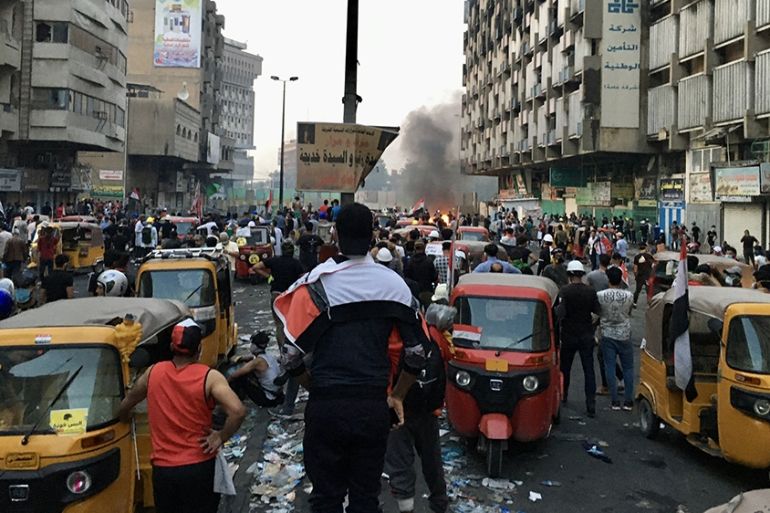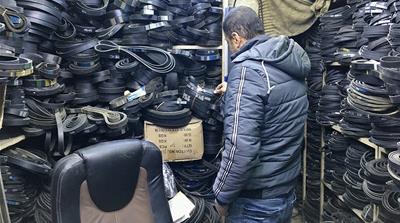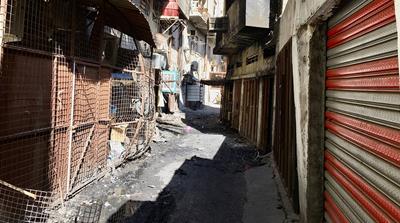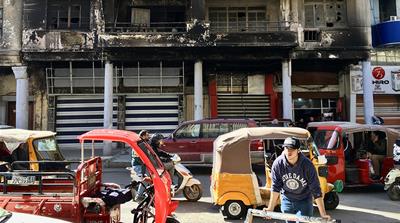Ruined: Baghdad small businesses ravaged by months of protests
Clashes between anti-government protesters and Iraqi security forces have devastated commerce in Baghdad’s city centre.

Baghdad, Iraq – By the time Mazen Mohammad woke to the news of a fire in his warehouse, the Iraqi businessman had lost an estimated $2m in merchandise. All three floors and the basement of the warehouse had been engulfed in flames overnight, when violent clashes between anti-government protesters and security forces sparked the fire in Baghdad’s commercial centre.
The fire began around 11pm on November 15th and continued to burn for weeks, say business owners. The pungent, toxic air forced some local families to temporarily relocate to other parts of the city.
Keep reading
list of 4 itemsChina’s economy beats expectations, growing 5.3 percent in first quarter
Inside the pressures facing Quebec’s billion-dollar maple syrup industry
Manipur’s BJP CM inflamed conflict: Assam Rifles report on India violence
Driven by demands for more job opportunities and an end to government corruption and foreign interference, the four-month-old popular uprising in Baghdad has frequently spiralled into violent confrontations between demonstrators and anti-riot security forces.
Over the course of the fall and winter months, deadly urban battles played out against the backdrop of the Iraqi capital’s historic centre. Tear gas, live ammunition and petrol bombs made the once-bustling neighbourhood a no-go area for the public.
Losses stemming from the subsequent halt in commerce and outright destruction of property dealt a devastating blow to small businesses there, says Iraqi urban planner Taghlib AbdulHadi al-Waily, the author of the book Baghdad 21st: Revival of a Historical City.
“The money lost is in the hundreds of millions [of dollars] due to the fact that the area is considered a huge warehouse and storage [centre],” al-Waily tells Al Jazeera, noting there is also “the loss of daily revenue due to the shutdown of those businesses”.

Fifty years up in flames
Between October and January, some 66 private properties were damaged in clashes, according to the Iraqi High Commission for Human Rights. Forty-six-year-old Mohammad’s warehouse was among them.
The massive storage rooms containing timing belts – black rubber rings used to power vehicle engines – are now dark and empty, filled only with the acrid smell of burned rubber and layered with dirt, ash and remnants of damaged merchandise.
Mohammad, whose family has been in the timing-belt business for over 50 years, said he couldn’t recall the exact number of units inside the warehouse, such was the quantity of merchandise that caught fire. But the countrywide distributor said every single floor had been jam-packed.
Like Mohammad, several other shopkeepers with storage rooms scattered across the narrow, 100 metre-long alleyway suffered the consequences as the fire spread. And while the business owners say they cannot point fingers at any single individual, they know that Iraq‘s ongoing protests are to blame for their losses.
Clashes between security forces and demonstrators have involved highly flammable petrol bombs and stun grenades, which are known to ignite flammable materials.
Vacuum cleaner vendor Raed Turki Shami, 72, said he incurred about $20,000 in damages. He plans to take the matter to court and has demanded an investigation into the incident. “We’ve had no compensation from the government,” he says, standing outside his charred storage room.

Rasheed Street: From retail centre to front line
A stone’s throw away from the charred building, on historic Rasheed Street, the once lively Mishmisha juice and ice-cream shop is empty.
Rasheed Street represents the very heart of Baghdad, urban planner al-Waily says. But what was once a prime business spot connecting the east and west gates of the city’s historic core is not the popular gathering place it used to be.
“The situation changed at the start of the demonstrations because the street closed, we were all affected, we all lost a lot of money,” said Mishmisha shop manager Nassim al-Bahar, 36, who is using a pseudonym and asked Al Jazeera to withhold his real name.
The shop’s daily income took a serious nosedive, says al-Bahar, plummeting from $800 to $83 and forcing him to lay off 18 of his 19 employees.
Despite the waning in violence and the road’s partial reopening to traffic in January, the once-24-hour-shop was forced to reduce its working business hours to eight.
Some Baghdad residents are still wary of visiting the city’s central areas, and Mishmisha has lost much of its usual clientele. “Life comes to a halt, no one comes through,” says al-Bahar, smoking s small, thin cigarette.
In October and November, when clashes were taking place on a daily basis, al-Bahar and his employees camped out inside the shop to make sure it stayed safe. Outside, the once-cheerful street had morphed into an active front line, paved with trash and heavy with clouds of tear gas.
“The violent responses to the protesters by the anti-riot squads have made serious damages to the architectural heritage of the street and its surroundings,” explains al-Waily. “Many buildings were set on fire and businesses had major losses.”

Built during the Ottoman rule of Iraq, Rasheed Street opened to the public in the summer of 1916 and soon became the country’s watering hole.
“At these times if you were a Baghdadi, a visitor, tourist or a merchant – if you ever wanted to eat, meet, drink, buy, enjoy, entertain or do anything or even do nothing in Baghdad – you would go to Al Rasheed Street,” says al-Waily.
Today, the street’s arcaded walkway and diverse architecture mean it is considered a heritage site.
And though demonstrations played a part in the road’s recent decline, the degradation of Rasheed Street began in the early 1990s during the Gulf War, continued through subsequent United Nations sanctions, and gathered pace after the United States-led invasion of 2003.
Since then, government officials have paid little attention to the historic road, its architecture or its businesses. “This is in large part due to corruption and lack of long-term planning,” says al-Waily.
Down the road from Mishmisha, 34-year-old shop manager Ali inspects damage to his shopfront. He works for a French company specialising in oils and additives.
“Before the protests we used to get 25 visitors a day, [and] now it’s about 10 to 15 people,” says Ali, who asked that his real name be withheld to protect his privacy. His shop closed down for 10 days, the door shuttered with an added iron sheet.
“There was gunfire and stun grenades,” he says, pointing out a bullet hole on the front door’s metal sheet, cracked windows, and the missing lights and security camera. Ali refused to disclose his overall losses, but said the window replacement alone cost the business $2,000.
“Rasheed Street is one of the well-known commercially active streets in Baghdad and it connects different commercial neighbourhoods, too,” Ali al-Bayati of the Iraqi High Commission for Human Rights tells Al Jazeera. “So, of course, it [stopped] such activities because of the protest.”

Last week al-Bayati called on the Iraqi government to compensate those whose properties had been damaged, while shopkeepers say they have unionised to push their demands to be made whole.
But as the weak, outgoing government cedes its place, the incoming one is just as unlikely to prioritise small businesses over other myriad and pressing issues, including the ongoing protests and the resurgence of the ISIL (ISIS) group.
“I hope [the protests] will be worth something,” shop owner Hassan Latif says. “In my time, as a youth, the country was controlled by law, but now it’s unsafe, lawless.”
Unlike his neighbours at the Mishmisha juice shop, Latif, who owns the Baghdad branch of German oil and additive company Liqui Moly, has not had to let go of any of his employees. “I pay their salary each month because they have families and they’re not responsible for what happened. I’m responsible for paying them.”
But not every business can afford to do this. “Employees depend on their daily pay,” says Mishmisha manager Nassim al-Bahar, as one lone customer walks into the shop to order an orange juice. “I want life to return to this street.”